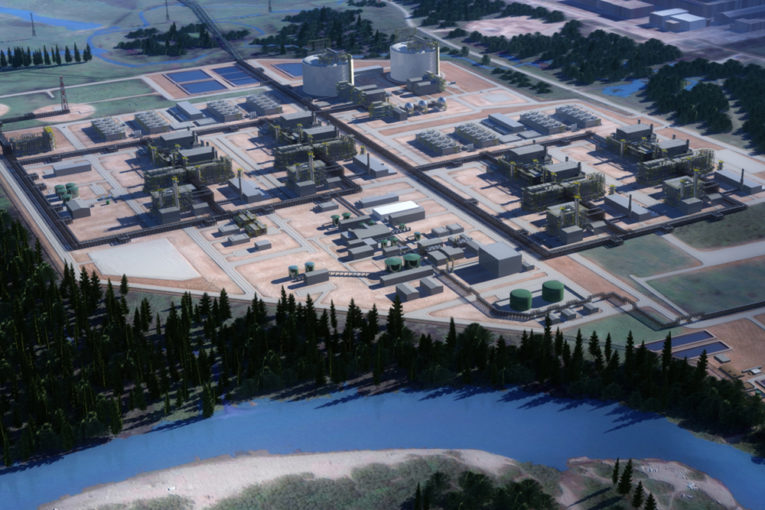
The energy giants behind the $40 billion LNG Canada project on the West Coast are warning that Ottawa’s steel safeguards will have a direct impact on the viability of their venture — one that may cause delays, investor uncertainty and a scaling back of production targets.
In a submission to the Canadian International Trade Tribunal (CITT), LNG Canada Development Inc. — the joint venture behind the largest private sector investment project in Canadian history — argues that extending the current, temporary safeguards on steel would also have serious negative repercussions on Canada’s “attempts to develop a reputation as a leader in global energy markets.”
“The various procurement decisions and actual Project construction are expected to take place over the next five years, almost all of which would be while the provisional or, if imposed, definitive safeguard measures are in place,” according to documents seen by the Financial Post.
“Subsequent phases of the Project (including the construction of two additional trains, doubling Plant capacity) require continued investor certainty, which is at risk due to safeguard measures that have a significant impact in isolation, and compounded by other recent trade restrictive measures taken by Canada.”
In October, Finance Minister Bill Morneau introduced immediate provisional safeguards on seven different steel products in an attempt to block a potential flood of imports from being diverted into Canada because of U.S. steel and aluminum tariffs.
The combination of tariffs and quotas are to remain in place for 200 days pending an independent investigation by the CITT — the quasi-judicial body charged with making a recommendation on whether the evidence warrants the imposition of “final safeguards” lasting three years.
Less than two weeks after Morneau’s announcement, Royal Dutch Shell Plc. and joint-venture partners Petroliam Nasional Bhd., PetroChina Co. Ltd., Mitsubishi Corp. and Korea Gas Corp. announced plans to fund the LNG mega-project, including a $6.2-billion natural gas pipeline through northern British Columbia and an $18-billion liquefaction facility in Kitimat, B.C.
The project requires certain steel products, including energy tubular steel, that fall under the safeguard restrictions — many of which cannot be produced in Canada, the filing states. For instance, 40 metre “inner rib piles” — used to build the port infrastructure in Kitimat — are not fabricated in Canada. Even if they were, the filing states, they could not be safely transported to the remote project site.
Though it is committed to providing opportunities to Canadian firms, LNG Canada says it has been unable to find an alternate solution to this problem using domestic suppliers.
“To the extent LNG Canada will need to use imported steel products, it will be because they are required due to a lack of capacity or expertise among domestic producers, and where it is not commercially feasible or physically possible to transport steel products across Canada to the Project site in Kitimat,” the filing states.
Canada’s safeguards are intended to ward off a surge in imports by creating a ceiling or quota on the amount of each product allowed into the country under standard duties — set at the average of the past three years of import volumes. All imports exceeding that amount face a tariff of 25 per cent. The U.S. — already subject to retaliatory tariffs — is exempted from the safeguard measures.
All imports from Mexico, are also excluded with the exception of energy tubular and wire rod products. Imports from both countries were found to have not contributed importantly to the injury or threat of injury to the market, the Ministry of Finance said in a previous release.
The LNG Canada filing argues that there has been no “sharp, sudden or and significant increase” in imports as a result of unforeseen circumstances and as such,no threat to domestic steel producers exists.
Any evidence of a rise in imports, “represents just one piece of a growing pie” or demand stemming from the expanding LNG industry.
“In other words, the LNG Canada Project is a rising tide that lifts all boats,” the document states.
Morneau’s safeguard announcement has prompted concerns about potential supply shortages in various downstream industries. The LNG filing suggests the restrictions could harm primary steelmakers too.
“Canadian steel manufacturers that currently serve the energy industry have an entirely new sector in which to specialize and grow,” according to the document. “If Canada makes decisions that result in the inability of major projects to deliver on investment promises, including cost certainty, future investment will look elsewhere. This risk will impact all interested parties, including domestic producers, which are currently well positioned to take advantage of a growing demand for steel as a result of future investment in Canada’s oil and gas industry.”
The government has said it will provide relief in the form of refunds on import tariffs paid on imported U.S. steel and aluminum products that are in short supply in Canada.Those refunds depend on the severity of the shortage, and will be paid out on a case-by-case basis.
“We continue to listen to the concerns of some in the sector and are assessing ways to minimize the impact of safeguards in certain specific import situations, while maintaining the broad objectives of the provisional safeguards,” a spokesperson from the Ministry of Finance said Wednesday.
The CITT’s hearings on the steel safeguard measures will begin Jan. 7 in Ottawa.
• Email: [email protected] | Twitter: Naomi_Powell
You can read more of the news on source
